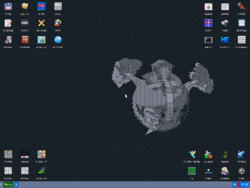Main Page: Difference between revisions
Jump to navigation
Jump to search
Yogev ezra (talk | contribs) |
|||
| Line 46: | Line 46: | ||
== KolibriOS Features == | == KolibriOS Features == | ||
* A [http://en.wikipedia.org/wiki/Monolithic_kernel monolithic] [http://en.wikipedia.org/wiki/Preemption_(computing) preemptive] [http://en.wikipedia.org/wiki/Kernel_(computer_science) kernel] that is less | * A [http://en.wikipedia.org/wiki/Monolithic_kernel monolithic] [http://en.wikipedia.org/wiki/Preemption_(computing) preemptive] [http://en.wikipedia.org/wiki/Kernel_(computer_science) kernel] that is less than 100 kilobytes in size, complete with streams, parallel execution of system calls and a [[New_stack|TCP/IP stack]]. | ||
* Speed: Thanks to being (carefully) written in Assembler, it's very fast. | * Speed: Thanks to being (carefully) written in Assembler, it's very fast. | ||
* Size: KolibriOS is very small - The kernel and most of the programs fit on a 1.44MB floppy disk! | * Size: KolibriOS is very small - The kernel and most of the programs fit on a 1.44MB floppy disk! | ||
* Filesystem support: Read/write support for FAT16/32 (with long file names) and ext2/3/4, read-only support for NTFS, CDFS(ISO9660) | * Filesystem support: Read/write support for FAT16/32 (with long file names) and ext2/3/4, read-only support for NTFS, XFS and CDFS (ISO9660). | ||
* Lightweight: Kolibri boots on any computer that has a Pentium (i586) compatible processor and at least eight megabytes of RAM. | * Lightweight: Kolibri boots on any computer that has a Pentium (i586) compatible processor and at least eight megabytes of RAM. | ||
* Hardware support: A lot of the popular sound, network and graphics cards are supported (see [[Hardware_Support|supported hardware list]]) | * Hardware support: A lot of the popular sound, network and graphics cards are supported (see [[Hardware_Support|supported hardware list]]) | ||
Revision as of 19:49, 4 February 2014
| KolibriOS | |
Error creating thumbnail: Unable to save thumbnail to destination
| |
 KolibriOS desktop | |
| Website: | www.kolibrios.org |
| Developed by: | KolibriOS Project Team |
| License: | GPL |
| Kernel type: | Monolithic kernel |
| Working state: | Active |
KolibriOS is an open source operating system for 32-bit x86 computers based on MenuetOS, written entirely in Assembler/FASM.
IMPORTANT: Help KolibriOS development by working on ideas from the Google Summer of Code 2014 list!
| Home | FAQ |
|---|---|
| Forum | Documentation |
| Nightly Builds | Wanted Features |
| Bug Tracker | |
| Source Repository | Applications |
| File Repository | Hardware Support |
| Development | All categories |
KolibriOS Features
- A monolithic preemptive kernel that is less than 100 kilobytes in size, complete with streams, parallel execution of system calls and a TCP/IP stack.
- Speed: Thanks to being (carefully) written in Assembler, it's very fast.
- Size: KolibriOS is very small - The kernel and most of the programs fit on a 1.44MB floppy disk!
- Filesystem support: Read/write support for FAT16/32 (with long file names) and ext2/3/4, read-only support for NTFS, XFS and CDFS (ISO9660).
- Lightweight: Kolibri boots on any computer that has a Pentium (i586) compatible processor and at least eight megabytes of RAM.
- Hardware support: A lot of the popular sound, network and graphics cards are supported (see supported hardware list)
- Comes with a development kit (code editor with FASM macro-assembler integrated).
Branches
- Kolibri-A - an embedded version of KolibriOS